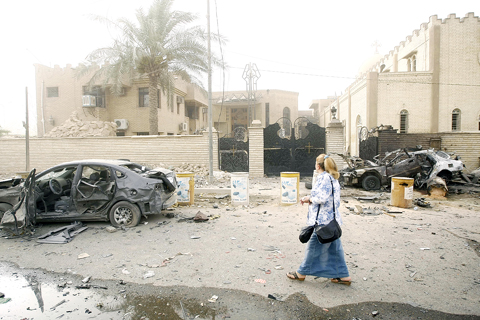A car bomb exploded near a church as worshippers left Sunday Mass, killing at least four civilians and injuring 18 in one of several attacks on Iraq’s beleaguered Christian minority.
The coordinated assault came as the Iraqi military predicted that insurgent attacks, though declining, could continue for a few years, raising the prospect of militant violence after the scheduled withdrawal of all US troops by the end of 2011.
Three Christians and one Muslim died in the bombing at about 7pm near a church on Palestine Street in eastern Baghdad, said a police officer who was at the scene. He spoke on condition of anonymity because he was not authorized to speak to the media.

PHOTO: AFP
An official at al-Kindi hospital confirmed the death toll and said at least 18 people were injured.
Also on Sunday, a bomb exploded near a convoy of US personnel that included US Ambassador Christopher Hill, though no one was injured.
US State Department spokeswoman Joanne Moore said the bomb exploded as the convoy was traveling through Dhi Qar Province in southern Iraq.
Violence is sharply down in the war that began with the US-led invasion in 2003, but militants still carry out lethal attacks on a regular basis, some seemingly aimed at fomenting sectarian tension.
The US military completed a withdrawal of combat forces from Iraqi cities to outlying bases last month as to let Iraq take the lead on ensuring its own security.
General Babaker Shawkat Zebari, the Iraqi army chief of staff, said insurgents once held sway in cities and provinces, but had been whittled down to a few highly dangerous cells that he expected would continue attacks for “a year or two or three.”
He said the Iraqi military would get help from US forces if needed, but would also rely on assistance from its own citizens.
“To face terrorism, the Iraqi army does not need tanks or armored vehicles, but needs intelligence, fast communication and people’s support,” he said.

When Shanghai-based designer Guo Qingshan posted a vacation photo on Valentine’s Day and captioned it “Puppy Mountain,” it became a sensation in China and even created a tourist destination. Guo had gone on a hike while visiting his hometown of Yichang in central China’s Hubei Province late last month. When reviewing the photographs, he saw something he had not noticed before: A mountain shaped like a dog’s head rested on the ground next to the Yangtze River, its snout perched at the water’s edge. “It was so magical and cute. I was so excited and happy when I discovered it,” Guo said.

Chinese authorities said they began live-fire exercises in the Gulf of Tonkin on Monday, only days after Vietnam announced a new line marking what it considers its territory in the body of water between the nations. The Chinese Maritime Safety Administration said the exercises would be focused on the Beibu Gulf area, closer to the Chinese side of the Gulf of Tonkin, and would run until tomorrow evening. It gave no further details, but the drills follow an announcement last week by Vietnam establishing a baseline used to calculate the width of its territorial waters in the Gulf of Tonkin. State-run Vietnam News

TURNAROUND: The Liberal Party had trailed the Conservatives by a wide margin, but that was before Trump threatened to make Canada the US’ 51st state Canada’s ruling Liberals, who a few weeks ago looked certain to lose an election this year, are mounting a major comeback amid the threat of US tariffs and are tied with their rival Conservatives, according to three new polls. An Ipsos survey released late on Tuesday showed that the left-leaning Liberals have 38 percent public support and the official opposition center-right Conservatives have 36 percent. The Liberals have overturned a 26-point deficit in six weeks, and run advertisements comparing the Conservative leader to Trump. The Conservative strategy had long been to attack unpopular Canadian Prime Minister Justin Trudeau, but last month he

Four decades after they were forced apart, US-raised Adamary Garcia and her birth mother on Saturday fell into each other’s arms at the airport in Santiago, Chile. Without speaking, they embraced tearfully: A rare reunification for one the thousands of Chileans taken from their mothers as babies and given up for adoption abroad. “The worst is over,” Edita Bizama, 64, said as she beheld her daughter for the first time since her birth 41 years ago. Garcia had flown to Santiago with four other women born in Chile and adopted in the US. Reports have estimated there were 20,000 such cases from 1950 to